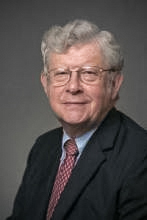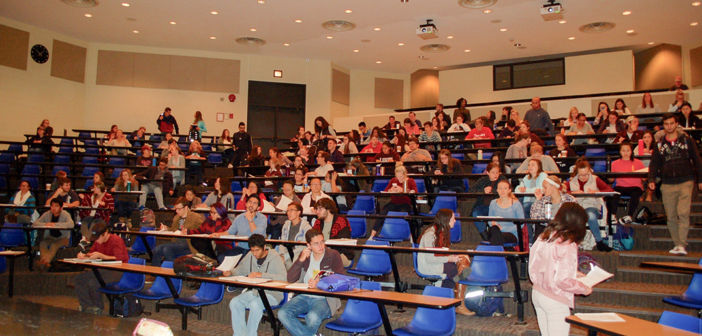It’s the first week of classes. More than 150 students are seated in an organic chemistry lecture, feeling anxious about the semester. The next lecture, they notice a few more students in the room. The next, even more. By the time they notice 85 more faces in the room, classes have been in session for more than a month.
An organic chemistry section was permanently moved to another class section by the chemistry department two weeks ago.

Professor Ned D. Heindel (Courtesy of the Lehigh University website)
On Sept. 27, professor Suzanne Fernandez received an email asking if 85 students in professor Ned Heindel’s section, the only other organic chemistry section, could be permanently moved into her classroom for the rest of the semester. The notice was not expected.
The classes were combined due to student complaints regarding the quality of Heindel’s teaching. Fernandez, who has taught full-time at Lehigh for two years, said she noticed more students in her class throughout the month of September, prior to her receiving the email.
David Vicic, the chairman of the chemistry department, said combining the two course sections was entirely a student choice.
“I think the students solved the problem by themselves,” Vicic said. “Professor Fernandez has been the main instructor for organic chemistry. She has it down to a science, so maybe that’s why students have gravitated toward her.”
Vicic said professors sometimes emphasize different parts of the material, and this raises students’ concerns of missing critical class content. Both professors contribute to writing exams for the course. However, when the professors focus on different material, the students’ performance on those exams may vary.
Heindel began teaching organic chemistry this year as a replacement for professor Keith Schray. Heindel did not respond to requests from The Brown and White for comment.
Vicic said Heindel is doing his best to learn from the experience.
“I think (Heindel) is disappointed,” Vicic said. “I think he spent time preparing materials that emphasized what he thought was important.”
Emilia Galka, ‘18, said although she feels Fernandez’s teaching style is more effective, she still likes Heindel as a person. Galka was registered in Heindel’s lecture but attended Fernandez’s lecture prior to the combination of the two sections.
“I thought he was great,” said Galka. “I heard people went to his office hours, and they said he was really good at explaining things, so maybe he just isn’t good in a large classroom setting.”
Galka said Heindel simply wasn’t able to cover the material at an appropriate rate before the first exam.
While Fernandez said she didn’t tell her class the average of the first exam, grade discrepancies between the two sections made it necessary to find a fair solution for all students.
Fernandez is offering a make-up test of the first exam to all students Nov. 2, two days after the second midterm. While students’ opinions on the make-up exam are mixed, Galka said the option is a fair solution to balance the grades.
“I wish (the test) was a week later, but I feel like the concepts we learned are things we’ve been using all along,” Galka said. “Everyone gets to take it, so it’s not like anyone’s getting hurt in any way. Plus, if you do worse on the re-test, you can keep your original grade.”
Vicic said in order to handle the logistics of office hours with such a large class, Heindel will continue to help with all aspects of the course, except for lectures. Fernandez currently offers 11 open office hours per week for students seeking help.
Vicic said situations such as these likely exist within all departments at Lehigh. He said it is important to document negative evaluations of professors.
“It’s an interesting problem,” Vicic said. “You don’t want to reward professors for bad behavior and say, ‘Well, you can’t teach this class so we’ll just have someone else do it.’ You have to hold them accountable and make sure they continue to get better.”
Vicic said he thinks Heindel was emphasizing practical applications, while Fernandez may have been emphasizing different aspects of the course. The main issue arose when students were expected to take the same exam.
One solution is for each professor to write their own exams covering the material from their respective lectures, Vicic said. This way, professors can retain their own teaching styles.
Vicic said he hopes when Heindel teaches the class again, he’ll be aware of what the students need in order to do well and learn material not only practical in nature, but relevant for their exams.






Comment policy
Comments posted to The Brown and White website are reviewed by a moderator before being approved. Incendiary speech or harassing language, including comments targeted at individuals, may be deemed unacceptable and not published. Spam and other soliciting will also be declined.
The Brown and White also reserves the right to not publish entirely anonymous comments.
3 Comments
This is insane, and while I understand that the reporter may not be familiar with either the course or Ned’s work and career, there’s obviously quite a lot missing from this story. Ned’s a tremendously experienced teacher and chemist, and a longtime favorite as a professor and advisor. Something is wrong.
It sounds to me as though there’s a new focus on a particular pedagogy aimed at producing particular grade distributions, and that Ned, likely with justification, thought that the changes were not actually useful to students who meant to use organic chemistry. It also sounds as though the appropriate solution is for each professor to write his or her own exam, reflecting the course he or she is teaching. And if different profs are teaching different aspects of organic (or anything else), then that’s actually a good thing. It means you, the student, figure out what’s important to you and find your teachers. It’s a valuable and important part of college. If you want a standardized course because all you can think about is your GPA and how to game it, there’s no need to come to a university, because you’re not interested in finding teachers. You’re looking for a standard course product, and you can find those online, certainly for less than Lehigh charges.
Sounds badly handled.
I think Amy has hit the nail right on the head. There is a lot more to this story than meets the eye.
Just for background, I am a 1974 Ph.D, student with Professor Heindel. In 1972, I had just completed a Master’s degree in Chemistry and was looking to earn my Ph.D. with someone who was doing heterocyclic and medicinal chemistry and also someone who would be a caring advisor. I came to Lehigh in 1972 solely to work with Professor Heindel. Had to be one of the best decisions I have ever made, he was beyond anything I could have imagined and we have been friends for 44 years.
I know 85 students is a large number but to give some perspective, I can probably name a few hundred students Professor Heindel has personally helped throughout the years……for many of us folk, Professor Heindel WAS and IS Chemistry at Lehigh University……..
I have not spoken to Professor Heindel or anyone else at Lehigh about this story…….but here’s a take from someone who taught Organic Chemistry for 16 years…..teaching both Organic I and Organic II each fall and spring semester.
1) There should be only one professor who teaches organic chemistry.
Having two professors is sure formula for disaster. One professor will be perceived by students as being “better”, “better” can be a better teacher, better can be “easier” or less demanding, better can be whatever……
Case in point if I recall, Keith Schray, an exceptional and successful teacher, was the sole organic prof at Lehigh for years.
2) If there are two professors, each professor should write their own exams and teach their own course.
For as many organic professors as there are, there are that many approaches to teaching organic…….there is no single approach……….they all get to same destination, it is just the routes that are different.
Again, I will say I know nothing of the specific of this story…..but there has to be a lot going on…..Professor Heindel, the set up of the course, and the students are obviously all in the mix but let’s not forget the Chair……
In most departments, the Chair makes decisions on courses and teaching assignments….from this article, his involvement seems to me to be that of an innocent bystander.
maybe some follow up with Chair Vicic on his actions are in order …………why two professors, why was each professor not writing their own exams, and is it the standard policy of the Chemistry Department for students to decide who teaches or who does not teach courses. ……
Dig a little deeper…….
As Amy said, “Sounds badly handled”
Doc, is that you? This is Josh Roden from Middlesex. Took your class in Fall 2010 and part 2 in Spring 2011. Would really be happy to say ‘hello’ and buy you a coffee. Please reach out – roden.joshua@gmail.com